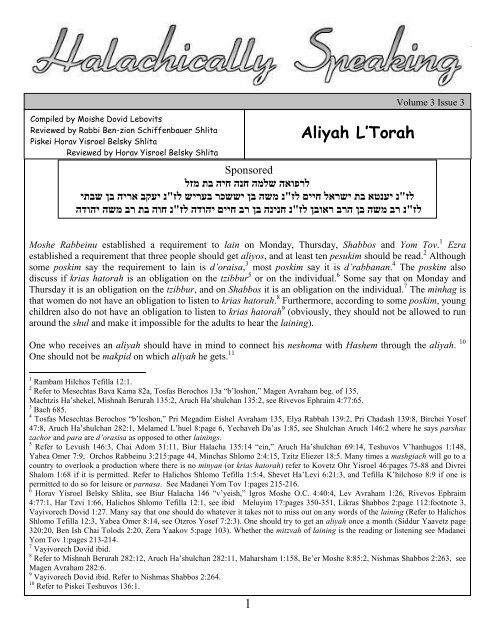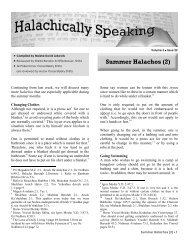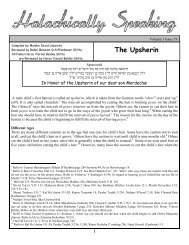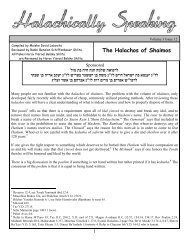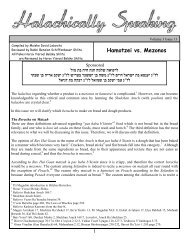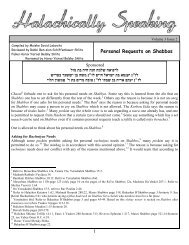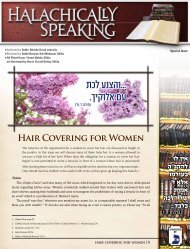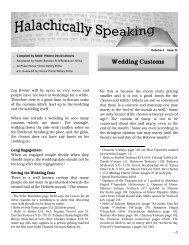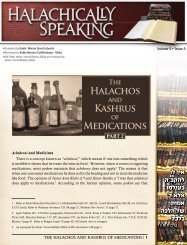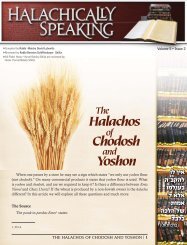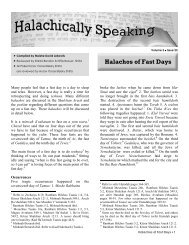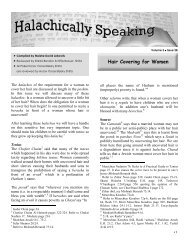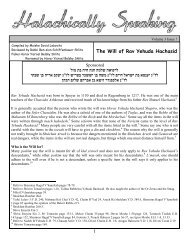Aliyah L'Torah - Halachically Speaking
Aliyah L'Torah - Halachically Speaking
Aliyah L'Torah - Halachically Speaking
You also want an ePaper? Increase the reach of your titles
YUMPU automatically turns print PDFs into web optimized ePapers that Google loves.
<strong>Halachically</strong> <strong>Speaking</strong><br />
Compiled by Moishe Dovid Lebovits<br />
Reviewed by Rabbi Ben-zion Schiffenbauer Shlita<br />
Piskei Horav Yisroel Belsky Shlita<br />
Reviewed by Horav Yisroel Belsky Shlita<br />
Sponsored<br />
<strong>Aliyah</strong> L’Torah<br />
לרפואה שלמה חנה חיה בת מזל<br />
לז"נ יענטא בת ישראל חיים לז"נ משה בן יששכר בעריש לז"נ יעקב אריה ב ן שבתי<br />
לז"נ רב משה בן הרב ראובן לז"נ חנינה בן רב חיים יהודה לז" נ חוה בת רב משה יהודה<br />
Volume 3 Issue 3<br />
Moshe Rabbeinu established a requirement to lain on Monday, Thursday, Shabbos and Yom Tov. 1 Ezra<br />
established a requirement that three people should get aliyos, and at least ten pesukim should be read. 2 Although<br />
some poskim say the requirement to lain is d’oraisa, 3 most poskim say it is d’rabbanan. 4 The poskim also<br />
discuss if krias hatorah is an obligation on the tzibbur 5 or on the individual. 6 Some say that on Monday and<br />
Thursday it is an obligation on the tzibbur, and on Shabbos it is an obligation on the individual. 7 The minhag is<br />
that women do not have an obligation to listen to krias hatorah. 8 Furthermore, according to some poskim, young<br />
children also do not have an obligation to listen to krias hatorah 9 (obviously, they should not be allowed to run<br />
around the shul and make it impossible for the adults to hear the laining).<br />
One who receives an aliyah should have in mind to connect his neshoma with Hashem through the aliyah. 10<br />
One should not be makpid on which aliyah he gets. 11<br />
1 Rambam Hilchos Tefilla 12:1.<br />
2 Refer to Mesechtas Bava Kama 82a, Tosfas Berochos 13a “b’loshon,” Magen Avraham beg. of 135,<br />
Machtzis Ha’shekel, Mishnah Berurah 135:2, Aruch Ha’shulchan 135:2, see Rivevos Ephraim 4:77:65.<br />
3 Bach 685.<br />
4 Tosfas Mesechtas Berochos “b’loshon,” Pri Megadim Eishel Avraham 135, Elya Rabbah 139:2, Pri Chadash 139:8, Birchei Yosef<br />
47:8, Aruch Ha’shulchan 282:1, Melamed L’huel 8:page 6, Yechaveh Da’as 1:85, see Shulchan Aruch 146:2 where he says parshas<br />
zachor and para are d’orasisa as opposed to other lainings.<br />
5 Refer to Levush 146:3, Chai Adom 31:11, Biur Halacha 135:14 “ein,” Aruch Ha’shulchan 69:14, Teshuvos V’hanhugos 1:148,<br />
Yabea Omer 7:9, Orchos Rabbeinu 3:215:page 44, Minchas Shlomo 2:4:15, Tzitz Eliezer 18:5. Many times a mashgiach will go to a<br />
country to overlook a production where there is no minyan (or krias hatorah) refer to Kovetz Ohr Yisroel 46:pages 75-88 and Divrei<br />
Shalom 1:68 if it is permitted. Refer to Halichos Shlomo Tefilla 1:5:4, Shevet Ha’Levi 6:21:3, and Tefilla K’hilchoso 8:9 if one is<br />
permitted to do so for leisure or parnasa. See Madanei Yom Tov 1:pages 215-216.<br />
6 Horav Yisroel Belsky Shlita, see Biur Halacha 146 “v’yeish,” Igros Moshe O.C. 4:40:4, Lev Avraham 1:26, Rivevos Ephraim<br />
4:77:1, Har Tzvi 1:66, Halichos Shlomo Tefilla 12:1, see ibid Meluyim 17:pages 350-351, Likras Shabbos 2:page 112:footnote 3,<br />
Vayivorech Dovid 1:27. Many say that one should do whatever it takes not to miss out on any words of the laining (Refer to Halichos<br />
Shlomo Tefilla 12:3, Yabea Omer 8:14, see Otzros Yosef 7:2:3). One should try to get an aliyah once a month (Siddur Yaavetz page<br />
320:20, Ben Ish Chai Tolods 2:20, Zera Yaakov 5:page 103). Whether the mitzvah of laining is the reading or listening see Madanei<br />
Yom Tov 1:pages 213-214.<br />
7 Vayivorech Dovid ibid.<br />
8 Refer to Mishnah Berurah 282:12, Aruch Ha’shulchan 282:11, Maharsham 1:158, Be’er Moshe 8:85:2, Nishmas Shabbos 2:263, see<br />
Magen Avraham 282:6.<br />
9 Vayivorech Dovid ibid. Refer to Nishmas Shabbos 2:264.<br />
10 Refer to Piskei Teshuvos 136:1.<br />
1
<strong>Halachically</strong> <strong>Speaking</strong><br />
Who Should Lain<br />
The custom used to be for each person who got an aliyah to lain his pesukim aloud. Today this is not the case,<br />
and one person who knows the trup and how to lain properly is designated to lain for all aliyos. 12<br />
Refusing an <strong>Aliyah</strong><br />
The Gemorah 13 says one of the things that shorten a person’s life is if he is called to receive an aliyah to the<br />
Torah and he refuses to go up. 14 The Maharsha 15 says the reason is since the person has refused to be called to<br />
the Torah which is life, his punishment is death. A person who knows he will be called up for an aliyah may<br />
leave before he is called to avoid having to go up for the aliyah. 16 A person who will be embarrassed if he goes<br />
for the aliyah (i.e. he can’t pronounce the words properly) does not have to go to the Torah when he is called. 17<br />
Being Called by Name for an <strong>Aliyah</strong><br />
One should not go up to the Torah unless he is called up by his Hebrew name. 18 Some say if one goes to an<br />
aliyah without being called up first his beracha will be in vain. 19 The minhag of the Sefardim seems to be that<br />
one is not called up by his name. 20 This is because of the concern that if he is called by his name and does not<br />
go, his life will be shortened. 21 This custom seems to have been adapted in some parts of Yerushalayim as<br />
well. 22 Although some Yeshivas may be lenient in this regard, this is not the correct practice. 23 One who is<br />
being called up to the Torah should say “Rav” etc before mentioning his fathers name to avoid transgressing the<br />
issur of mentioning the name of one’s father. 24 If the Gabbai calls his own father for an aliyah he should say<br />
yaleh “avi” followed by his father’s name. 25<br />
Wearing a Tallis<br />
One who is called up to the Torah should wear a tallis because of kovod ha’tzibbur. 26 On Monday and<br />
Thursday, unmarried boys who are wearing tefillin do not need to put on a tallis. On Shabbos at Mincha there is<br />
no need for someone who receives an aliyah to wear a tallis since the tzibbur does not wear a tallis at that<br />
time. 27 When receiving an aliyah, one should cover his head with the tallis. 28<br />
11 Pela Yoetz “sefer” page 32 (old).<br />
12 Refer to Sharei Ephraim 3:1.<br />
13 Mesechtas Berochos 55a. Refer to Elya Rabbah 139:2 why this is not in Shulchan Aruch. He says because this halacha was only<br />
talking in the days when the oleh read from the Torah.<br />
14<br />
Refer to Magen Avraham 53:22, Machtzis Ha’shekel, Pri Chadash 139:1, Torah L’shma 95, Lev Chaim 3:12, Mishnah Berurah<br />
139:1, Aruch Ha’Shulchan 139:4, Shemiras Haguf V’hanefesh 262:footnote 2 in depth.<br />
15 Mesechtas Berochos 55a.<br />
16 Tzitz Eliezer 14:34:1.<br />
17 Tzitz Eliezer 18:29. See Yesodo Yeshurin 2:page 201, Halichos Olom 7:page 195.<br />
18 Sharei Rachamim 1:19, Sharei Chaim 1:20, Yeshuos Maklu 12, Kitzur Shulchan Aruch 85:1, Avnei Nezer C.M. 103, Binyan Tzion<br />
(chadashes) 172:page 90, Aruch Ha’shulchan 13:4, Minchas Elazar 4:49, Orchos Rabbeinu 1:page 71:27, Rivevos Ephraim 2:80:25,<br />
Tzitz Eliezer 17:16:3, see Darchei Moshe 135:8, Rama 139:3. Refer to Yesodo Yeshurin 2:pages 185-188 in depth.<br />
19 Shulchan Hatohar 139:3.<br />
20 Yalkut Yosef 141:21.<br />
21 Yalkut Yosef ibid.<br />
22 Chaim Shaul 1:13, Kaf Ha’chaim 139:9, Likras Shabbos 2:page 115. Refer to Aruch Ha’shulchan E.H. 129:81.<br />
23 Teshuvos V’hanhugos 2:98.<br />
24 Otzer Kibbud Av V’eim page 143:81-82, Morei Horim V’kibudom 6:36.<br />
25 Eretz Tzvi 1:97, Morei Horim V’kibudom 6:36.<br />
26 Sharei Ephraim 3:18, Aruch Ha’shulchan 91:2, Kaf Ha’chaim 147:4, Rivevos Ephraim 4:77:52, Minhag Yisroel Torah 141:1,<br />
Likras Shabbos 2:24:8. Refer to Doleh U’mashka page 97.<br />
27 Halichos Shlomo Tefilla 12:20:footnote 29.<br />
28 Refer to footnote 26.<br />
2
<strong>Halachically</strong> <strong>Speaking</strong><br />
Walking to and From the Bimah<br />
One who gets called for an aliyah should go to the bimah quickly because of kovod ha’tzibbur, 29 and after<br />
finishing his aliyah should go away from the bimah slowly because of kovod ha’torah. 30<br />
Therefore, one who gets called for an aliyah should take the shortest path to the bimah, and after his aliyah is<br />
over he should take a longer way back to his seat. 31 If both paths to the bimah are equal in length, one should<br />
take the path on the right side. 32<br />
The Rama 33 says one should not leave the bimah until the next person is called up. However, the minhag in klal<br />
yisroel is that one who received an aliyah does not go down until the aliyah and berochos of the person who<br />
received an aliyah after him are finished. 34 The reason is because we are concerned that one who returns to his<br />
seat in middle of laining will not be able to concentrate properly. 35<br />
Showing the Words in the Torah<br />
Before reciting the beracha on the sefer Torah, one should be shown the words from which the laining will<br />
begin. 36 In this way a person will know what he is reciting the beracha on. 37 There are different minhagim as to<br />
whether the Torah should be kept open or closed while one is reciting the beracha. 38 Many poskim say that the<br />
sefer Torah should be kept opened. 39 If the sefer Torah was kept closed during the beracha, it should be opened<br />
after the beracha is completed. 40 One should not look in the sefer Torah while reciting the beracha. 41 Some<br />
have the custom to close their eyes while reciting the beracha. 42<br />
Turning one’s Head<br />
One should turn his head away from the sefer while making the beracha. 43 Some say the custom is to turn his<br />
head towards the left side. 44 However, since today, the custom is that the one who receives an aliyah stands on<br />
the right side and the ba’al koreh on the left, one should turn his head to the right side. 45 Nonetheless,<br />
whichever way one turns his head is acceptable.<br />
29 Elya Rabbah 141:9, Sharei Ephraim 4:1, Mishnah Berurah 141:25.<br />
30 Kaf Ha’chaim 41, Mishnah Berurah 26.<br />
31 Mishnah Berurah 141:23.<br />
32 Bais Yosef 139, Darchei Moshe 139:1, Shulchan Aruch 141:7, Levush 7, Lekutei Maharich 1:page 187 (new), Aruch Ha’shulchan<br />
9, Kaf Ha’chaim 38. The chazzon bringing the sefer Torah to the bimah should also go the shorter way (Magen Avraham 141:7,<br />
Mishnah Berurah 25, Kaf Ha’chaim 37).<br />
33 141:7, see Levush ibid.<br />
34 Magen Avraham 141:8, Machtzis Ha’shekel, Be’er Heitiv 141:7, Elya Rabbah 9, Sharei Ephraim 4:1, Chai Adom 31:10, Mishnah<br />
Berurah 26, Aruch Ha’shulchan 11.<br />
35 Refer to poskim in footnote above.<br />
36 Shulchan Aruch 139:4, Ben Ish Chai Toldos 2:18, Kaf Ha’chaim 23.<br />
37 Mishnah Berurah 16.<br />
38 Refer to Eishel Avraham Butchatch 140:3, Sharei Ephraim 4:3, Kaf Ha’chaim 23. .<br />
39 Refer to Magen Avraham 6, Taz 4, Levush 5, Mishnah Berurah 17, Aruch Ha’shulchan 12, Orchos Rabbeinu 3:page 214:39 quoting<br />
the opinion of the Chazzon Ish. Refer to Biur Halacha “ro’eh.” This is the custom of Horav Yisroel Belsky Shlita.<br />
40 Sharei Ephraim 4:3.<br />
41 Elya Rabbah 7, Pri Megadim Eishel Avraham 6.<br />
42 Orchos Rabbeinu 3:page 214:39, see Halacha Berurah 139:7.<br />
43 Rama 139:4. Levush 5. Some do not turn their head at all (Chai Adom 31:12, Mishnah Berurah 19).<br />
44 Magen Avraham 8, Machtzis Ha’shekel, Levush ibid, Aruch Ha’shulchan 13.<br />
45 Sharei Halacha U’minhag O.C. 85:page 184, Ve’alu Lo Ubol 1:page 99:133, Halichos Shlomo Tefilla 12:footnote 68, Piskei<br />
Teshuvos 139:footnote 62.<br />
3
<strong>Halachically</strong> <strong>Speaking</strong><br />
Kissing the Sefer Torah before the Beracha<br />
Before reciting the beracha on an aliyah some have the custom to kiss the sefer Torah by taking a tallis 46 or the<br />
gartel of the sefer Torah and passing it on the klaf of the Torah. 47 Others are concerned that doing so may cause<br />
one to erase some of the letters of the Torah. 48 The custom of others is to touch the klaf near the letters, and not<br />
to actually touch any letters of the sefer Torah. 49 Many have the custom to kiss the sefer Torah at the end of an<br />
aliyah. 50 However, there is no need to kiss the place which was just read. 51<br />
Bowing to the Sefer Torah<br />
Some poskim quote the custom to bow to the sefer while reciting the beracha on the Torah. 52 However, others<br />
say that the custom is not to bow. 53 Whichever minhag one has he should do. One who does have the custom to<br />
bow should not bow at the end of the beracha because doing so would make it appear that he is adding to the<br />
bowing which is done on a daily basis (i.e. during Shemonei Esrei). 54<br />
Holding the Atzei Chaim during the Beracha<br />
One is not allowed to hold a sefer Torah without a hefsek of some sort. 55 However, the minhag of most of klal<br />
yisroel is that one may indeed hold the atzei chaim of a sefer Torah without any separation. 56 While reciting the<br />
beracha, one should hold the atzei chaim with two hands. 57 When the laining begins (after his beracha), he<br />
should let go of the left atzei chaim and hold onto the sefer Torah with his right hand. 58 The reason for holding<br />
onto the Torah is to show we do not want to let the Torah be removed from our mouths. 59 Some say the reason<br />
we hold the Torah is to demonstrate by our aliyah that it is like we just got the Torah from Har Sinai. 60<br />
Just as there is a custom to hold onto the sefer Torah and not let go during the kriah, there is a custom to recite<br />
“chazak” after the last aliyah of each sefer. 61 Some say it is not clear where the custom to say chazak chazak<br />
v’nischazek came from, 62 and one should recite “chazak” three times which is the numerical equivalent of the<br />
word Moshe. 63 Nonetheless, the common custom is to recite chazak chazak v’nischazek after each sefer is<br />
completed. 64 Some say the custom is to recite v’nischazak instead of v’nischazek. 65 The oleh does not recite<br />
46 Aruch Ha’shulchan 139:15.<br />
47 Sharei Ephraim 4:3, Halichos Shlomo Tefilla 12:footnote 68, Sharei Halacha U’minhag O.C. 85, Orchos Rabbeinu 1:page 71:27,<br />
see Ketzos Ha’shulchan 25:badi 24.<br />
48 Shulchan Hatohar 139:8, Sharei Rachamim 4:4, Nemukei Orach Chaim 139:1, see Kaf Ha’chaim 27.<br />
49 Horav Yisroel Belsky Shlita.<br />
50 Magen Avraham 139:14, Yad Ephraim 12, Elya Rabbah 14, Sharei Ephraim 4:21, Mishnah Berurah 35, Aruch Ha’shulchan 15,<br />
Piskei Teshuvos page 161, Sharei Halacha U’minhag O.C. 85.<br />
51 Siach Tefilla page 258.<br />
52 Magen Avraham 139:6, Elya Rabbah 7, Chesed L’alafim 135:9, Mishnah Berurah 19, Shulchan Hatohar 8, see Halacha Berurah<br />
139:9.<br />
53 Kaf Ha’chaim 25, Aruch Ha’shulchan 14. Refer to Lechem Chamudos Berochos 5:65.<br />
54 Sharei Ephraim 4:4.<br />
55 Shulchan Aruch 147:1.<br />
56 Refer to Sharei Ephraim 4:4, Mishnah Berurah 147:2, Ve’alu Lo Ubol 1:page 101:118, Halichos Shlomo Tefilla 12:footnote 68,<br />
Orchos Rabbeinu 1:page 71:27, see Shulchan Hatohar 139:8 and Darchei Chaim V’Sholom 214 who argue.<br />
57 Tur 139, Bach, Darchei Moshe 3, Prisha 3, Shulchan Aruch 139:11, Taz 9, Ben Ish Chai ibid.<br />
58 Magen Avraham 139:18, Kitzur Shulchan Aruch 23:3, Aruch Ha’shulchan 15.<br />
59 Rama 139:1.<br />
60 Bais Yosef, Levush 11,<br />
61 Rama 139:11. See Levush 669:1, Aruch Ha’shulchan 139:15, Rivevos Ephraim 4:77:74, 6:155, Orchos Rabbeinu 2:page 313:18,<br />
Refer to Pri Chadash 139:11 for an additional reason for saying chazak.<br />
62 Ketzos Ha’shulchan 84:13:badi 21, Rivevos Ephraim 5:232:2, see Eyunei Halachos 2:page 235.<br />
63 Elya Rabbah 669:18, Chesed L’alafim 139:22, Aruch Ha’shulchan 139:15. Refer to Meor V’shemesh Vayichei page 58b.<br />
64 Ketzos Ha’shulchan ibid, see Aruch Ha’shulchan ibid.<br />
65 Horav Yisroel Belsky Shlita. Refer to Rivevos Ephraim 3:441, 8:613. This is based on a posuk in Shmuel 2:10:12.<br />
4
<strong>Halachically</strong> <strong>Speaking</strong><br />
chazak etc. because doing so would be a hefsek between the laining and the beracha. 66 The ba’al koreh does<br />
recite chazak. 67 Some Sefardim say to the oleh chazak u’boruch at the end of every aliyah. 68<br />
Standing with One’s Back to the Sefer Torah<br />
The Mishnah Berurah 69 says one who is standing by the bimah (i.e. for an aliyah, or while reading the haftorah)<br />
should be careful not to stand with his back to a sefer Torah being held by someone sitting near the bimah. This<br />
is common on Yom Tov when two seforim are taken out, and the person holding the second sefer is sitting<br />
directly behind the oleh. Nonetheless, the custom is that one may stand with his back to the sefer Torah 70 since<br />
the oleh is standing in the correct place, and the sefer Torah is not in its proper place. 71<br />
Standing during an <strong>Aliyah</strong><br />
In most places, one who receives an aliyah stands in between the ba’al koreh and the gabbai. 72 Only three<br />
people are required at the bimah while the laining is taken place (gabbai, oleh, ba’al koreh). 73 However, the<br />
custom of many places is for a fourth person to stand on the other side of the ba’al koreh (gabbai sheini). 74<br />
One is required to stand throughout his aliyah 75 to demonstrate fear of Hashem. 76 A person who is weak or<br />
heavy may lean on the bimah. 77 Furthermore, one who is confined to a wheelchair may receive an aliyah while<br />
sitting. 78 The one who is laining should also stand. 79 Many times, in order for the ba’al koreh to show the oleh<br />
where he is up to, he has to bend over to show the place with the yad. This practice is permitted. 80<br />
Many say one should not lean on the cover of the bimah because it serves as a tashmish d’kedusha. 81 However,<br />
many poskim say the minhag is to be lenient in this regard. 82 For this reason, some say one can place seforim,<br />
etc on a bimah. 83<br />
66 Horav Yisroel Belsky Shlita, see Divrei Yatziv 1:130, Be’er Moshe 3:28, Shevet Ha’Levi 7:202:2:page 200, Rivevos Ephraim 2:98,<br />
4:80, 5:233:1, 6:155, 8:578:11, Eyunei Halachos 2:page 238, see Nishmas Shabbos 2:253 where he argues. Refer to Yugel Yaakov<br />
page 142 quoting the opinion of Horav Henkin zt”l. The Shulchan Aruch Harav in hosofos to Lekutei Minhagim 4:page 726b says the<br />
oleh says chazak etc. (Refer to Eyunei Halachos 2:page 237).<br />
67 Horav Yisroel Belsky Shlita, see Elya Rabbah ibid. However this is only if he does not get the last aliyah. (Horav Yisroel Belsky<br />
Shlita).<br />
68 Yufei Leleiv 139:15, Chesed L’alafim 135:22, Kaf Ha’chaim 139:56, Halacha Berurah 139:19. The oleh answers back chizku<br />
v’amtzu.<br />
69 147:29, see Pri Megadim M.Z. 141:3.<br />
70 Halichos Shlomo Tefilla 12:footnote 21.<br />
71 Halichos Shlomo ibid.<br />
72 Refer to Sharei Rachamim 3:12, Mishnah Berurah 141:16, Aruch Ha’shulchan 141:7, Kaf Ha’chaim 141:10, 22, Ketzos<br />
Ha’shulchan 25:11, Minhag Yisroel Torah 141:2, Halacha Berurah 141:7.<br />
73 Chai Adom 31:7, Mishnah Berurah 141:16. Some say his is not me’achev (Halacha Berurah 141:7).<br />
74 Shulchan Hatohar 141:3.<br />
75 Rambam Hilchos Tefilla 12:11, Bach beg of 141, Pri Megadim M.Z. 146:1, Levush 1, Magen Avraham 141:2, Kitzur Shulchan<br />
Aruch 23:5, Aruch Ha’shulchan 141:1-2.<br />
76 Magen Avraham ibid, Pri Megadim Eishel Avraham 2, Ben Ish Chai ibid:20, Kaf Ha’chaim 4, Darchei Chaim V’sholom 202, see<br />
Moadim V’zemanim 2:182.<br />
77 Magen Avraham ibid, Aruch Ha’shulchan 3, Kaf Ha’chaim 7. A heavy person cannot lean if he will fall if the object he is leaning<br />
on is removed (Be’er Heitiv 2, Mishnah Berurah 2-4) Others say a complete leaning is permitted (Shar Ha’tzyion 4).<br />
78 Bais Avi 4:57, Piskei Teshuvos 141:footnote 2, Yalkut Yosef 141:2.<br />
79 Tur 141, Bais Yosef, Rama 1, Sharei Ephraim 3:11.<br />
80 Sharei Ephraim 3:11, Halacha Berurah 141:2.<br />
81 Refer to Bais Yosef 154, Be’er Heitiv 141:2, Mishnah Berurah 141:4, 154:10, Shar Ha’tzyion 8, Ginzei Hakodesh 5:footnote 42<br />
quoting the opinion of Horav Korelitz Shlita, see Rama 154:8.<br />
82 Oz Nedberu 3:49, see Biur Halacha 154 “v’i.”<br />
83 Refer to Piskei Teshuvos 154:27:footnote 162, Ginzei Hakodesh 5:15:footnote 44. See ibid:page 268:90.<br />
5
<strong>Halachically</strong> <strong>Speaking</strong><br />
Reciting Borchu and the Berochos<br />
One should say borchu and the berochos out loud so the one’s listening may respond. 84 If the oleh missed<br />
saying borchu it is not me’achev. 85 Some say that the oleh should say boruch Hashem ha’mevorech quietly. 86<br />
However, many people do say it out loud, and this seems to be the custom. 87 The reason why the oleh repeats<br />
boruch Hashem ha’mevorech … after the tzibbur is to be included with those who are bentched. 88 Some say the<br />
bercohos should not be said quietly, and one who did so would have to repeat the berochos. 89 However, l’maseh<br />
if the beracha and the borchu were said quietly, one does not have to repeat them. 90 The Sefer Chassidim 91 says<br />
one who recites the berochos too low has stolen the mitzvah from the tzibbur. One who forgot to recite the last<br />
beracha before kaddish was recited should say the last beracha after kaddish. 92<br />
After saying boruch Hashem ha’mevorech… we say boruch ata .. asher bochar bonu etc. 93 Even though one<br />
has already said this beracha in the morning, it is repeated because of kovod ha’tzibbur. 94 The Aruch<br />
Ha’shulchan 95 says the beracha is an expression of thanks to Hashem. One should shake the Torah a bit when<br />
one says the words “v’nosson luno es toraso” in the first beracha 96 and asher nosson luno toras emes of the last<br />
beracha. 97<br />
The ba’al koreh should say amen after the beracha of the oleh, 98 and should stretch out his amen for the tzibbur<br />
to understand that the laining is about to start and they should pay attention. 99 Some say the tzibbur should<br />
answer amen when the oleh says boruch Hashem ha’mevorech …; 100 this does not seem to be the common<br />
custom. 101 Some are careful to answer boruch hu u’boruch shemo after the oleh has said the boruch ata Hashem<br />
of asher bachur bonu. 102<br />
One should close the sefer Torah before reciting the last beracha. 103 The Aruch Ha’shulchan says it is proper to<br />
close the sefer Torah in between the aliyahs. 104<br />
84 Refer to Shulchan Aruch 139:6, Rama, Leush 7, Sharei Ephraim 4:7, Mishnah Berurah 23, 25, Ketzos Ha’shulchan 25:7, Pela Yoetz<br />
“sefer” page 32 (old).<br />
85 Rav Poalim 4:8, Be’er Moshe 4:18. Refer to Rivevos Ephraim 4:43 where he is not sure what the halacha is in this case.<br />
86 Sharei Ephraim 4:6.<br />
87 Elya Rabbah 9, Sharei Ephraim 4:6.<br />
88 Shulchan Aruch 139:7.<br />
89 Shulchan Aruch 139:6. Kaf Ha’chaim 41. Refer to Biur Halacha end of 57.<br />
90 Biur Halacha “v’haberochos,” Aruch Ha’shulchan 17, Vezos Hatorah 64:24:footnote 42, Refer to Elya Rabbah 9.<br />
91 254, see Sharei Ephraim 4:7.<br />
92 Rivevos Ephraim 3:95:3.<br />
93 Shulchan Aruch 139:8, Levush 7.<br />
94 Magen Avraham 5, Mishnah Berurhah 15. See Aruch Ha’shulchan 9. Refer to Pri Megadim Eishel Avraham beg of 135 why we do<br />
not say v’tzivanu by this beracha. See Yalkut Yosef 139:footnote 18.<br />
95 139:10.<br />
96 Magen Avraham 139:12, Sharei Ephraim 4:4, Kaf Ha’chaim 139:26.<br />
97 Aruch Ha’shulchan 139:14. This is not me’achev. The shaking here refers to lifting the sefer Torah a little by lifting the atzei chaim<br />
that one is holding (Aruch Ha’shulchan 139:14). The Sefardim do not have this minhag (Kaf Ha’chaim 139:26, Halacha Berurah<br />
139:18). The Aruch Ha’shulchan 16 says the reason for this last beracha is because we are only zocheh to chai olom through the<br />
Torah. Therefore, after the learning which is the laining we say this beracha.<br />
98 Mishnah Berurah 141:17. If the ba’al koreh says amen after his own beracha when receiving an aliyah he does not have to repeat<br />
the beracha (Shevet Ha’Levi 8:92:2).<br />
99 Sharei Ephraim 4:8, Mishnah Berurah ibid.<br />
100 Magen Avraham 66:6, Sharei Ephraim 4:6, Mishnah Berurah 57:4<br />
101 Aruch Ha’shulchan 66:8, Rivevos Ephraim 6:63:7. Refer to Pri Megadim Eishel Avraham 57:1 says if one wants he may answer.<br />
102 Rivevos Ephraim 7:page 451.<br />
103 Shulchan Aruch 139:4, Sharei Ephraim 4:21, see 24, Mishnah Berurah 20, Halacha Berurah 139:8.<br />
104 139:16.<br />
6
<strong>Halachically</strong> <strong>Speaking</strong><br />
Reading along with the Ba’al Koreh<br />
The oleh must read along with the ba’al koreh during his aliyah. If one did not read along, his beracha was a<br />
beracha l’vatala. 105 Based on the writing of the Zohar, only the ba’al koreh should read and not the oleh. 106<br />
Some say the Zohar only refers to reading out loud and therefore the oleh should read along quietly with the<br />
shatz. 107 However, this is not the custom, and one may read even if he hears the words he is saying. 108<br />
Nevertheless, one should not say the words so loud that the ba’al koreh will become confused during his<br />
laining. 109 Many people are not careful with this which is incorrect. Many question why we do not say<br />
shomeha k’oneh in this situation, since the ba’al koreh is reading the oleh should not have to read. 110<br />
If the Ba’al Koreh has a Different Pronunciation<br />
Many times it happens that one gets an aliyah (or davens) in a place where the ba’al koreh has a different<br />
havarah. The question arises whether one is yotzei laining. The opinion of most poskim is that one is yotzei. 111<br />
The Chazzon Ish took issue with an Ashkenazi being yotzei with a Sefardik ba’al koreh. 112 The Brisker Rav was<br />
always careful to listen to laining from a person who had the same pronunciation as he did. 113<br />
Selected Halachos for the Tzibbur<br />
Leaving Before the End of Laining<br />
Once the sefer torah is opened 114 one may not leave the shul 115 even if laining did not start yet. In between<br />
aliyos one would be able to leave since the sefer Torah is covered. 116 However, before leaving one should<br />
make sure there are ten people left to listen to the laining. 117 One should also remember to come back if he has<br />
not yet been yotzei laining. 118 However, many poskim say leaving is only permitted if one has a big need to exit<br />
the shul. 119 Therefore, if one can wait to use the bathroom until after the entire laining has finished, it is<br />
preferable to do so. 120 (By Akdomus it is permitted for one to leave, since our minhag is that we do not read it<br />
from a sefer Torah). 121 One should not leave in middle of laining even by the krias hatorah of Simchas Torah<br />
105 Tur 141, Bais Yosef, Mishnah Berurah 10, Rivevos Ephraim 4:77:23, Avnei Yushfei 1:131:2, Refer to Yalkut Yosef 141:pages<br />
115-117 in depth.<br />
106 Bais Yosef, Chai Adom 31:5, Kaf Ha’chaim 16,18. The Shulchan Hatohar 139:1 says it is forbidden for the oleh to say anything<br />
while the shatz is laining.<br />
107 Darchei Moshe 2, Drisha 1, Shulchan Aruch 141:2.<br />
108 Rama 141:2, Levush 2, Magen Avraham 4, Be’er heitiv 3, Mishnah Berurah 13, Aruch Ha’shulchan 4, see Shar Ha’tzyion 12. Biur<br />
Halacha “l’vatala.”<br />
109 Sharei Ephraim 4:8.<br />
110 Refer to Taz 3, Mamer Mordechai 141:3, Halichos Olom 3:pages 130-133 in depth, see Sheilas Yaavetz 1:75 why it is not possible<br />
to say shomeha k’oneh here. Refer to Likras Shabbos 2:pages 131-132, Rivevos Ephraim 6:215:41.<br />
111 Refer to Yosef Ometz 20:2, Teshuvos V’hanhugos 1:128, 1:154, Moadim V’zemanim 2:170:footnote 16, Rivevos Ephraim 7:360,<br />
Yechaveh Da’as 4:3, 6:19:page 109, Yaskil Avdi 8:6:1, Halichos Olom 3:page 133, Minchas Yitzchok 4:47:1, Oz Nedberu 3:page<br />
156, Bunim Chavivim page 257 quoting the opinion of Horav Chaim Kanievesky Shlita, See Bunim Chavivim pages 333-334. Some<br />
say this applies even to parsahs zochar (Bumim Chavivim page 340).<br />
112 Refer to Chazzon Ish O.C. Hilchos Tefillin 9:6, Orchos Rabbeinu 1:page 70:24.<br />
113 Teshuvos V’hanhugos 1:154.<br />
114 Biur Halacha “k’shehu.”<br />
115 Gemorah Berochos 8a, Rosh 1:7, Rambam Hilchos Tefilla 12:9, Shulchan Aruch 146:1, Levush 1, Sharei Ephraim 4:15, Chesed<br />
L’alafim 135:11, Aruch Ha’shulchan 1, Kaf Ha’chaim 3,6.<br />
116 Gemorah ibid, Rosh ibid, Tur, Bais Yosef, Drisha 1, Bach, Shulchan Aruch ibid, Levush ibid.<br />
117 Refer to Eishel Avraham Butchatch, Mishnah Berurah 2.<br />
118 Mishnah Berurah 3.<br />
119 Magen Avraham 2, Mishnah Berurah 3, Aruch Ha’shulchan 1. Refer to Ben Ish Chai Toldos 2:17 who is stringent. See Halichos<br />
Olom 3:page 134 who is lenient even without a big need.<br />
120 Aruch Ha’shulchan 1, Chai Ha’Levi 1:15:9.<br />
121 Machtzis Ha’shekel 1, see Magen Avraham 1.<br />
7
<strong>Halachically</strong> <strong>Speaking</strong><br />
morning when the laining is only a minhag. 122 Some say even one who already heard krias hatorah should not<br />
leave in middle of laining, 123 while others are lenient. 124 If necessary, one is permitted to leave before the last<br />
beracha. 125 On a fast day one who is not fasting may leave during laining. 126 The minhag seems to be that those<br />
who come to collect money may leave in between aliyos and there is no need for them to stay until the end of<br />
laining. The reason is because their leaving is considered a big need, since they have to go many places to<br />
collect money and if they would wait until the laining is completely over they would lose money. 127 The same is<br />
true if a shul has many different minyanim and one has to pass through some of them to get out of shul. 128<br />
Although some poskim are stringent and say one should not leave during the laining of any of the megillahs, 129<br />
the minhag is to be lenient. 130<br />
Talking During and in Between the <strong>Aliyah</strong><br />
Once the sefer Torah is opened (even before the laining started) 131 it is forbidden to talk- even words of Torah.<br />
Talking is likewise forbidden in between the aliyos. 132 The reason is because we are afraid the person will<br />
become immersed in his conversation and miss part of laining. 133 Others say it is permitted to learn quietly<br />
during laining if one’s job is Torah. 134 However, this is not the minhag today because there is no one who<br />
qualifies for this condition. 135 Although, one may be maaver sedra during laining, 136 doing do is not<br />
recommended. 137 One who sees someone who is doing an issur, can tell him to stop even during laining. 138 A<br />
person can answer a question in between aliyahs. 139<br />
The Magen Avraham 140 says that since we make a mi ‘sh’be’rach in between the aliyos then one can be lenient<br />
and talk. 141 However, it is not clear what the Magen Avraham means. Some say he means it is permitted to talk<br />
122 Shulchan Aruch Hamikutzar 22:footnote 38.<br />
123 Mishnah Berurah 1. The Pri Megadim Eishel Avraham 2 is in doubt.<br />
124 See Eishel Avraham Butchatch, Kaf Ha’chaim 3.<br />
125 Pri Chadash 1, Biur Halacha “shapir,” Rivevos Ephraim 8:570:6. Refer to Kaf Ha’chaim 4 who is stringent.<br />
126 Rivevos Ephraim 2:154.<br />
127 Piskei Teshuvos 146:footnote 6, Minhag Yisroel Torah 146:1.<br />
128 Chai Ha’Levi 5:15:3.<br />
129 Rivevos Ephraim 2:151:2 quotes the Chazzon Ish, 3:473:21, 4:173:40, 5:453, Halichos Chaim 1:page 58:156.<br />
130 Rivevos Ephraim 2:151:2 quoting the opinion of Horav Moshe Feinstein zt”l.<br />
131 Magen Avraham 3, Levush 146:2, Mishnah Berurah 4, see Gr’a 2, Elya Rabbah 3, Sharei Ephraim 4:11, Aruch Ha’shulchan 3, Kaf<br />
Ha’chaim 8, who argue.<br />
132 Gemorah Sotah 39a, Tosfas “keivon,” Rosh Berochos 1:17, Rambam Hilchos Tefilla 12:9, Tur 146, Shulchan Aruch 146:2, Levush<br />
2, Kitzur Shulchan Aruch 23:8.<br />
133 Bais Yosef, Levush 3, Mishnah Berurah 6.<br />
134 Mesechtas Berochos 8a, Rif Berochos page 4 Tur, Shulchan Aruch 146:2, Sharei Ephraim 4:12.<br />
135 Refer to Bais Yosef who says it was only permitted for Rav Sheshes (mentioned in Gemorah ibid), see Elya Rabbah 5, Mishnah<br />
Berurah 9, Shar Ha’tzyion 15, Aruch Ha’shulchan 6, Nishmas Shabbos 2:252:2.<br />
136 Hag’oes Ashri Berochos Rosh ibid, Shulchan Aruch 146:2, Magen Avraham 5, Pri Megadim Eishel Avraham 5, Pri Chadash 2,<br />
Levush 3, Sharei Ephraim 4:12, Mishnah Berurah 11,15.<br />
137 Divrei Chamudos Berochos 1:34, see 35, Malbushei Yom Tov 4, Elya Rabbah 4, Sharei Ephraim 4:11, Mishnah Berurah 14, Biur<br />
Halacha “v’likros,” 285: “yochol,” Mishnah Berurah 282:14, Kaf Ha’chaim 18, Yechaveh Da’as 2:37.<br />
138 Darchei Moshe 146:1, Pri Megadim Eishel Avraham 4, Be’er Heitiv 2, Mishnah Berurah 5, Kaf Ha’chaim 9.<br />
139 Machtzis Ha’shekel 4, Elya Rabbah 4, Sharei Ephraim 4:11. If the question is of urgent matter it is permitted to answer it during<br />
laining (Refer to Aruch Ha’shulchan 141:2).<br />
140 Magen Avraham 3, see Bach 146.<br />
141 Magen Avraham 3, Pri Megadim Eishel Avraham 7, Shulchan Hatohar 141:1, Minhag Yisroel Torah 141:2.<br />
8
<strong>Halachically</strong> <strong>Speaking</strong><br />
even words of chol. 142 However, most poskim disagree with this and therefore, one is forbidden to talk divrei<br />
chol during laining and in between aliyos. 143<br />
Many people not only talk in between the aliyahs, but also during the aliyah. These people often speak things<br />
which are forbidden to speak, and are definitely forbidden in a bais medrash. 144 The poskim say regarding one<br />
who talks during laining: “what will he answer on the Day of Judgment.” 145 Horav Zilberstein Shlita said if<br />
one wants to make sure no sefer Torah falls on the floor in a Shul, one must make sure there is no talking from<br />
the beginning of laining until the end. 146 The Bais Yisroel did not let anyone who spoke in middle of laining<br />
into his house. 147<br />
If one will talk during laining he may leave in between the aliyahs and talk outside. 148 One who feels he must<br />
talk between aliyos to avoid talking during laining may talk a short word or two in between aliyos. 149 One can<br />
be lenient and learn by himself in between aliyos. 150 One who learns in between the aliyos must still be careful<br />
to listen to the barchu and berochos of each oleh. 151<br />
A Rav should not give a speech to his congregants in between the aliyos. 152 Some say if it is an appeal it is<br />
permitted. 153<br />
Many poskim say that the tzibbur should not read along while the laining is taking place, and instead they<br />
should listen carefully to the ba’al koreh. 154 One who will not have time to be maaver sedra may read along<br />
with the ba’al koreh. 155<br />
Sitting/Standing during Laining<br />
Most poskim maintain that one who is listening to the laining does not have to stand during laining. 156 Many<br />
poskim say that although one may sit for the laining, one has to stand for the borchu and berochos. 157 Some<br />
142 Pri Chadash 2, see Machtzis Has’shekel 3, see Likras Shabbos 2:24:34.<br />
143 Elya Rabbah 4, Mamer Mordechai 146:7, Chesed L’alafim 135:13, Mishnah Berurah 6, Aruch Ha’shulchan 5, Kaf Ha’chaim 10,<br />
Moreh Yecheskel 26, Nishmas Shabbos 2:246, Singing zemiros are permitted according to some poskim (Mamer Mordechai 146:5).<br />
Refer to Metzuvei V‘osei page 485.<br />
144 Biur Halacha “v’hanochon.” Refer to Nishams Shabbos 2:249. One may not talk during the haftorah (Pri Megadim 284 M.Z. 1,<br />
Levush 1, Halacha Berurah 146:9).<br />
145 Be’er Heitiv 3, Elya Rabbah 5.<br />
146 Hilchos Kedushas Bais Hakenesses U’Bais Hamedrash page 149.<br />
147 Ibid:page 135.<br />
148 Nishmas Shabbos 2:251.<br />
149 Horav Yisroel Belsky Shlita, see Aruch Ha’shulchan 146:5.<br />
150 Mishnah Berurah 146:6, Kaf Ha’chaim 13, Refer to Biur Halacha “v’yeish,” Nishmas Shabbos 2:249.<br />
151 Elya Rabbah 4, Kaf Ha’chaim 10.<br />
152 Igros Moshe O.C. 4:40:21, Rivevos Ephraim 3:467:2, 533:5.<br />
153 Kaf Ha’chaim 11, Nishmas Shabbos 2:248.<br />
154 Chesed L’alafim 135:14, Shulchan Hatohar 146:1, Mishnah Berurah 14, 285:14-15, Kaf Ha’chaim 18, Massei Rav 131:page 157,<br />
see Sharei Ephraim 4:12, Mishnah Berurah 15, Nishmas Shabbos 2:252 who argue.<br />
155 Shulchan Aruch 285:5, see Magen Avraham 8, Mishnah Berurah 14, Biur Halacha “b’shas.”<br />
156 Bais Yosef 141, Prisha 1, Tur 146, Shulchan Aruch 146:4, Pri Chadash 4, Levush 1, Chesed L’alafim 135:14, Sharei Ephraim 4:9,<br />
Aruch Ha’shulchan 2, Yisroel B’mamadam 1:25:31. The Arizal sat (Kaf Ha’chaim 20, Shulchan Hatohar 146:4). Refer to Minhag<br />
Yisroel Torah 146:3.<br />
157 Magen Avraham 146:2, Taz 1, Be’er Heitiv 5, Elya Rabbah 4, Mishnah Berurah 18, Aruch Ha’shulchan 8, Ketzos Ha’shulchan<br />
25:badi 42, Pe’as Sudcha 1:10, Teshuvos V’hanhugos 1:142, 3:64, Ishei Yisroel 38:footnote 54 quoting the opinion of Horav Chaim<br />
Kanievesky Shlita.<br />
9
<strong>Halachically</strong> <strong>Speaking</strong><br />
people are mehader and stand throughout the whole laining. 158 Many people say this hiddur is the proper thing<br />
to do, since all of the people were standing by Har Sinai. 159 According to all opinions, one may sit in between<br />
the aliyos. 160 Those who stand in between the aliyos are doing a pious action. 161 Even according to the opinions<br />
that hold one should normally stand a weak or old person may sit during laining. 162<br />
There is a discussion in the poskim if one who has the custom to sit finds himself in a shul where everyone<br />
stands (and vice versa) is such a person required to stand 163<br />
The minhag in most places is for people to sit both during the recital of borchu and the bercohos. 164 There is no<br />
obligation to stand by the last beracha. 165 Some say one may sit after the tzibbur says boruch Hashem<br />
ha’mevorech…. 166<br />
Some poskim say one should not stand when the Aseres Hadibros are read, because of a concern that it may<br />
seem one is hinting only this portion of the Torah is true and nothing else. 167 However, the minhag amongst the<br />
Asheknazim is to stand for the Aseres Hadibros. 168 Preferably one should stand up at the beginning of the<br />
aliyah.<br />
The minhag is to stand during the laining of the Oz Yushir in Parshas Beshalach. 169 Preferably one should stand<br />
up at the beginning of the aliyah.<br />
The poskim question where the minhag to stand by chazak came from. 170<br />
158 Horav Yisroel Belsky Shlita, Refer to Bach 141, Darchei Moshe 141:1, Rama 146:4, Taz 1, G’ra 9, Kitzur Shulchan Aruch 23:6,<br />
Mishnah Berurah 19, Aruch Ha’shulchan 2, Kaf Ha’chaim 20, Teshuvos V’hanhugos 4:43. The Elya Rabbah 146:4 says it is an<br />
obligation not a chumra. (Refer to Lechem Chamudos Berochos 1:36). In Euorpe all people stood (Divrei Chachumim page 50:109).<br />
159 Aruch Ha’shulchan 141:2.<br />
160 Bach ibid, Magen Avraham 7, Be’er Heitiv 6, Pri Megadim Eishel Avraham 7, Pri Chadash 4, Kitzur Shulchan Aruch 23:6,<br />
Mishnah Berurah 20, Aruch Ha’shulchan 2,8.<br />
161 Sharei Ephraim 4:9.<br />
162 Sharei Ephraim 4:9, Mishnah Berurah 146:19. Horav Elyashiv Shlita sits because he is weak (Doleh U’mashka page 98). Horav<br />
Shteinman Shlita stands (ibid).<br />
163 Refer to Kaf Ha’chaim 22, Igros Moshe O.C. 4:22, Yechaveh Da’as 6:8, Betzel Hachuchma 5:1, Halacha Berurah 141:4, Oz<br />
Nedberu 6:43.<br />
164 Kaf Ha’chaim 20-21, Teshuvos V’hanhugos 3:64, see Taz 53:1.<br />
165 Kitzur Shulchan Aruch 23:6.<br />
166 Be’er Moshe 1:2, Halichos Shlomo Tefilla 6:footnote 48.<br />
167 Refer to Teshuvos HaRambam (Freeman) 46, Chesed L’alafim 135:14, Shulchan Aruch Hamikutzar 22:1, Yechaveh Da’as 1:29,<br />
6:8, Yabea Omer 8:15:16, Euynei Halachos 2:pages 243-244.<br />
168 Refer to Sharei Ephraim 7:37, Pischei Shearim 7:37, Devar Shmuel 276, Bais Yaakov 125, Tov Ayin 11:pages 516-517, Lekutei<br />
Maharich (seder krias hatorah l’Shabbos) pages 59-59b (old), Kaf Ha’chaim 23, 494:30, Betzel Hachuchma 5:17, Igros Moshe O.C.<br />
4:22, Tzitz Eliezer 14:1:7, Yaskil Avdi 2:1, 7:1, Be’er Moshe 8:60:5, Teshuvos V’hanhugos 1:144, 4:43, Orchos Rabbeinu 1:page<br />
120:85, Rivevos Ephraim 4:246, 5:209, 6:153:14 (quoting the opinion of Horav Moshe Feisntein zt”l), 8:500:2, Mekadesh Yisroel<br />
(Shavuos) 59.<br />
169 Ketzos Ha’shulchan 84:badi 22, Halichos Shlomo Tefilla 12:footnote 30, Rivevos Ephraim 3:194.<br />
170 Refer to Yisroel B’mamadam 1:25:footnote 140, Rivevos Ephraim 2:99, see Euynei Halachos 2:page 243. One who wants to sit by<br />
chazak when the entire tzibbur is standing may not do so (Euynei Halachos 2:pages 246-247). Some say the reason why we stand by<br />
chazak is to show that the entire sefer we read is true and not only the Aseres Hadibros (Euynei Halachos 2:page 243).<br />
10
<strong>Halachically</strong> <strong>Speaking</strong><br />
<strong>Halachically</strong> <strong>Speaking</strong> is a weekly publication compiled by Moishe Dovid Lebovits, chaver kollel of Kollel Nachlas<br />
Dovid in Yeshiva Torah Voda’as.<br />
Each week a different area of contemporary halacha is reviewed with an emphasis on practical applications of<br />
the principles discussed. Significant time is spent ensuring the inclusion of all relevant shittos on each topic, as<br />
well as the psak of Horav Yisroel Belsky, shlit”a on current issues. Detailed footnotes are provided for further<br />
study.<br />
For a weekly email subscription to <strong>Halachically</strong> <strong>Speaking</strong>, please send your email address to<br />
mdl@thehalacha.com. A nominal fee will be charged. Weekly sponsorships are available, please call 718 744<br />
4360.<br />
© Copyright 2007 Moishe Dovid Lebovits. All right reserved.<br />
11


